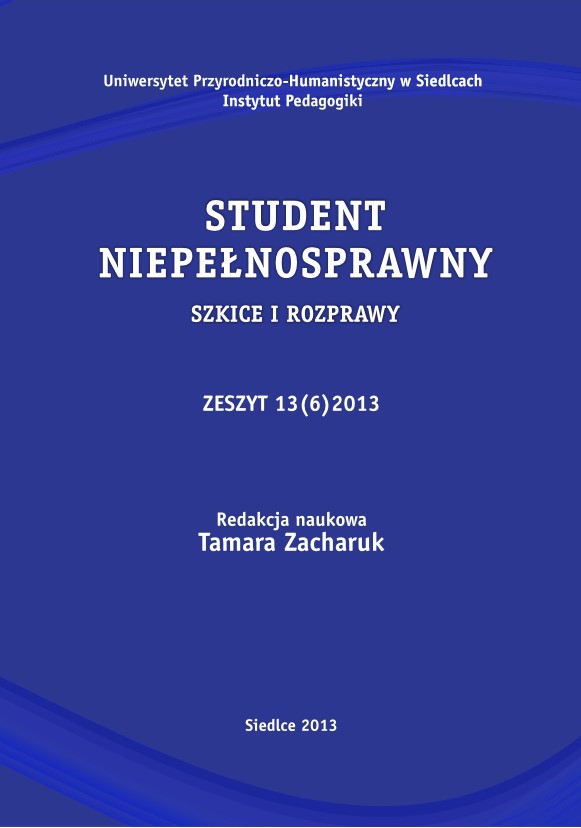Education of students with disabilities in Poland - results of the control carried out by the Supreme Chamber of Control (SCC)
Abstract
The constant growth of the number of disabled people in society contributes to a significant increase in the position of this problem amongst other social issues. Nowadays the medical model of understanding disability is on the decline in
comparison to the social model, which emphasizes the role of society as a debilitatingfactor.
In view of the fact that disability is a social problem, society is obliged to provide assistance to disabled people. An important challenge in this regard is to adjust kindergartens, schools and other institutions to the needs of disabled students with special educational needs.
The control of the education of students with disabilities in the school years 2009/2010, 2010/2011 and 2011/2012, carried out by the Supreme Chamber of Control (SCC) under the name of “Education of students with disabilities with special educational needs”, shows that in Poland it takes more and more actions and projects aimed at creating the conditions for students with disabilities, to encourage their holistic development and activation of full participation in social life. At the same time, the SCC points out that in many of the educational institutions educational standards depicted in the relevant legal regulations are still not assured.
Downloads
References
1. Barnes C., Mercer G., Niepełnosprawność, Wydawnictwo Sic!, Warszawa 2008.
2. GUS, Oświata i wychowanie w roku szkolnym 2011/2012, Zakład Wydawnictw Statystycznych, Warszawa 2012.
3. Fundamental Principles of Disability, UPIAS, London 1976.
4. Kirenko J., Oblicza niepełnosprawności, Wydawnictwo Akademickie Wyższej Szkoły Społeczno-Przyrodniczej im. Wincentego Pola, Lublin 2006.74 D. Rolka Zeszyt 13(6)2013
5. Kummat M., Założenia projektu – podstawy prawne kształcenia uczniów niepełnosprawnych, [w:] Szkoła dla wszystkich. Uczeń niepełnosprawny w szkole ogólnodostępnej, pod red. J. Boguckiej, D. Al.-Khamisy, Centrum Metodyczne Pomocy Psychologiczno-Pedagogicznej, Warszawa 2009.
6. Żbikowski J., Dąbrowski D., Kuźmicki M., Determinanty aktywności zawodowej osób niepełnosprawnych zamieszkałych na obszarach wiejskich. Raport z badań, t. I, Wydawnictwo Państwowej Szkoły Wyższej im. Papieża Jana Pawła II, Biała Podlaska 2012.
Akty prawne
1. Ustawa z 9 września 1991 r. o systemie oświaty, Dz.U. Nr 173, poz. 1808.
2. Rozporządzenie MENiS z dnia 26 lutego 2002 w sprawie podstawy programowej wychowania przedszkolnego oraz kształcenia ogólnego w poszczególnych typach szkół Dz.U. Nr 51 poz. 458, z późniejszymi zmianami: Dz.U. z 2003 r. Nr 210 poz. 2041; Dz.U. Nr 19 z 2005 r. poz. 165.
Źródła elektroniczne:
1. Biuro Pełnomocnika Rządu ds. Osób Niepełnosprawnych, www.niepelnosprawni.gov.pl
2. Informacja o wynikach kontroli Najwyższej Izby Kontroli pn. Kształcenie uczniów z niepełnosprawnościami o specjalnych potrzebach edukacyjnych (nr P/12/057), www.nik.gov.pl
3. System Informacji Oświatowej, www.cie.men.gov.pl




